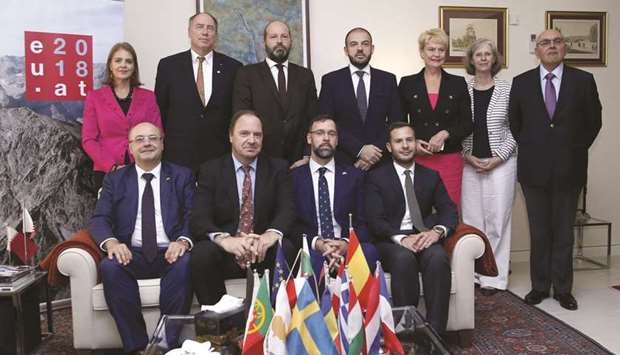“We are very happy to have a rich culture and diversity of languages in Europe with over 200 languages altogether, 24 official languages, which is an important tool in our day-to-day life in Europe and elsewhere,” Austrian ambassador Willy Kempel told a press conference yesterday at his residence in Doha.
The one-day event, organised by the European Union National Institutes for Culture (Eunic) cluster in Qatar (composed of 17 EU countries), offers free crash courses in 12 European languages.
The envoy said participants can attend several introductory classes (from 5pm to 9.30pm) of European languages of their choice: Bulgarian, Dutch, French, German, Greek, Hungarian, Italian, Polish, Portuguese, Romanian, Spanish, and Swedish.
The ‘European Day of Languages’, widely celebrated in Europe and in many countries around the world every year, also provides participants access to information on all the language courses, organised throughout the year in Qatar.
The Eunic cluster in Qatar encourages residents, especially students, to take advantage of the opportunity to start learning a new language at the event, which witnessed an increasing number of participants annually since its inception.
More than 120 have registered so far and the number is expected to increase especially during the event.
Kempel also announced that the staging of the 1st European Film Festival in Qatar, scheduled to open on October 18 at the Museum of Islamic Art Auditorium.
Dutch ambassador Dr Bahia Tahzib-Lie noted she was delighted that the European Day of Languages is being held this September – a month where the Netherlands’ Ministry of Foreign Affairs celebrates ‘Diversity and Inclusivity’.
“We are very proud that Dutch lessons are being given at a school here in Qatar for children and youth, we have a community of about 1,400 Dutch people here and the language is also spoken in different countries around the world, not only in Europe but also in Africa and the Caribbean,” she said.
For her part, Swedish ambassador Ewa Polano said the Swedish language course will also offer some cultural understanding of Sweden, as well as Swedish food “to broaden the feeling for Sweden.”
“Swedish is a small language but if people learn it they can go around in the Nordic countries because all the Nordics understand the Scandinavian languages so we have close co-operation on that,” she added.
Other EU ambassadors stressed the importance of learning a foreign language saying that it gives people a deeper understanding of the cultures of different countries.
“You can compare it to having access to a theme park, so you can get to more attractions.
If you know more languages, you will be exposed to many cultures and experiences,” Belgian ambassador Dr Bart D Groof said.
While German is the widely spoken language in the EU, Bulgarian ambassador Metin Kazak said the Bulgarian language is the only language in Europe which uses Cyrillic alphabets.

